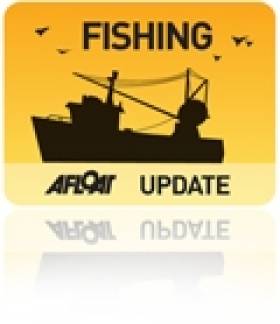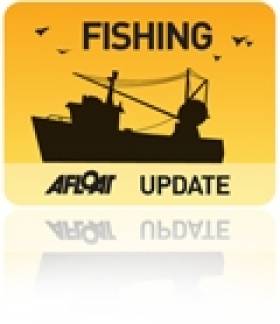Displaying items by tag: Spanish fishermen
Spanish Fisherman Fined for Illegal Fishing Activity
#fishing – Following a conviction at Cork Circuit Court, today, Friday 28th February, the Master of a Spanish fishing vessel was fined a total of €2,500 and forfeited €80,000, being the assessed value of his catch and a further €12,500 for the fishing gear onboard. Jesus Ramon Rea Rosales, Master of the fishing vessel Armaven Dos, pleaded guilty to the under-recording of monkfish in the vessel's EU logbook. The case arose during the course of a routine inspection of the Armaven Dos on the 5th August 2013, at Castletownbere, Co Cork, by Sea-Fisheries Protection Officers of the Sea-Fisheries Protection Authority (SFPA).
Sea-Fisheries Protection Officers inspected the vessel's onboard catch and when compared to its fishing logbook they discovered approximately 13 tonnes of monkfish retained onboard of which almost seven tonnes were unrecorded. In addition to the under-recording of monkfish, a substantial quantity of Megrim was also found to be unrecorded. The under-recording of catch is contrary to European Community Regulations as fishermen are required to keep an accurate record in the vessel's logbook of the fish they have onboard so that the catch limits and quotas imposed to protect these fish stocks are respected.
Susan Steele, Chair of the SFPA welcomed the outcome of the case and said: ""It is essential that all fishermen play their part in the rebuilding of damaged fish stocks such as monkfish if fishing is to be sustainable and profitable into the future. The requirement for fishermen to accurately record their catches and to keep within quota limits is a cornerstone of measures to rebuild damaged fish stocks and to share the burden of this stock recovery fairly among fishermen. The SFPA's inspection programme is intended to detect illegally caught fish and to protect the livelihoods of the many fishermen who respect the rules in place that safeguard the sustainable exploitation of valuable fish stocks. Stock recovery is good news for fishermen and ultimately leads to better fishing possibilities for the sector as well as improved market supply for consumers."
Spanish Fisherman Fined for Illegal Fishing Activity
The Master of a Spanish fishing vessel, the ‘Nuevo Murgados ‘ was fined and had his catch and gear confiscated by the State in a case brought before Cork Circuit Court on Tuesday 15th June 2010. Fines of €20,000 in total were imposed and forfeiture for the catch and gear amounted to €41,000. The Judge also imposed an award of €5,000 towards costs of the case. The case was the subject of a trial brought before Cork Circuit Court between the 29th of April to the 5th May 2010 whereby the defence sought to challenge the use of the new Omega Gauge in the measurement of nets.
The ‘Nuevo Murgados’ was boarded by the Naval Service off the West Coast of Ireland on the 28th September 2009, and was subsequently inspected by Sea-Fisheries Protection Officers (SFPOs). During the inspection, two nets were measured by the SFPOs using the Omega Gauge; the results were that nets were found to be 93.8mm and 77mm respectively which contravened EU regulation. The Master was charged with two offences including; logbook infringements -operating a net of less than 100mm whereas 100mm was recorded in the EU Logbook and retaining in excess of 20% Hake while operating a net between 55mm and 99mm.
On the 1st September 2009 the Omega Gauge was introduced as the definitive means for the measurement of the mesh size of fishing vessels operating in community waters. The Omega Gauge applies a predetermined force and calculates the average for a series of measurements ensuring consistency in measurement, whereas the preceding gauge required the inspector to apply a manual force.
Peter Whelan, Chairman of the SFPA said: “The defence in this case challenged the Omega Gauge, and in this context securing a conviction was significant. The use of the Omega Gauge has been the subject of some criticism however the outcome of this case proves the viability of the system. The Omega Gauge will provide a consistent reliable measurement for fishermen and should provide assurance for legitimate operators that the same result will be produced whenever their gear is measured. The Omega Gauge improves the methodology for mesh size measurement which will contribute to better implementation of technical conservation measures and the effectiveness of fishery management overall.”

























































